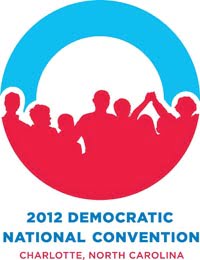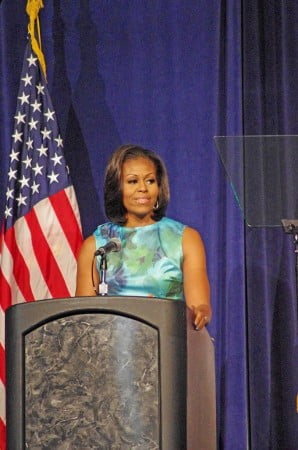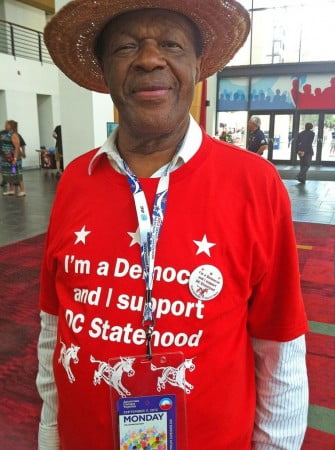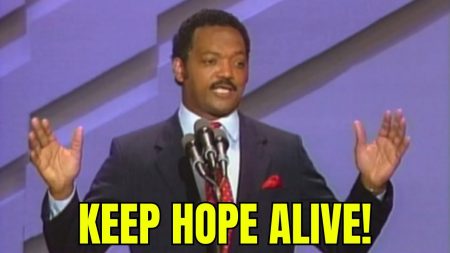President Obama’s Speech Analyzed
 In what was certainly among the finest political addresses in fifty years, President Obama’s speech accepting his nomination for a second term laid out a set of fundamental principles that, he said, have guided his entire career. As an oration, it began with less animation and excitement than his speeches in the past, but as an example of rhetorical craftsmanship that could serve as the underpinning of a successful reelection campaign, it was outstanding.
In what was certainly among the finest political addresses in fifty years, President Obama’s speech accepting his nomination for a second term laid out a set of fundamental principles that, he said, have guided his entire career. As an oration, it began with less animation and excitement than his speeches in the past, but as an example of rhetorical craftsmanship that could serve as the underpinning of a successful reelection campaign, it was outstanding.
The president began with the personal – a nod to his wife and daughters, and gratitude to Vice President Biden for his loyalty and friendship, and quickly segued into a brief overview of his entire philosophy of life.
Renewed emphasis on Hope
Hope, he said, is “not blind optimism or wishful thinking, but hope in the face of difficulty; hope in the face of uncertainty; that dogged faith in the future which has pushed this nation forward, even when the odds are great; even when the road is long. “
He described how his belief had been tested in the four years of his first term, “by the cost of war; by one of the worst economic crises in history; and by political gridlock that’s left us wondering whether it’s still possible to tackle the challenges of our time.”
Without a pause Mr. Obama issued a challenge to his audience, inviting them to share the burdens he carries by supporting the choices he has made – and will have to make in the future.
“I know that campaigns can seem small, and even silly. Trivial things become big distractions. Serious issues become sound bites. And the truth gets buried under an avalanche of money and advertising. If you’re sick of hearing me approve this message, believe me – so am I.
“But when all is said and done – when you pick up that ballot to vote – you will face the clearest choice of any time in a generation. Over the next few years, big decisions will be made in Washington, on jobs and the economy; taxes and deficits; energy and education; war and peace – decisions that will have a huge impact on our lives and our children’s lives for decades to come.
“On every issue, the choice you face won’t be just between two candidates or two parties.
“It will be a choice between two different paths for America.
“A choice between two fundamentally different visions for the future.”
Philosophy and values
With that compact between his options and the choices voters must make, the president distilled the abstracts of philosophy into a set of personal values that guide his decision-making – and, in comparison, to that of his opponents. The segue from the most intimate to the most abstract, from practical policy options to the political fight ahead, quickly crystallized his ideas into a powerful call to action.
Only then did the president begin to discuss the specific policies that he has implemented in his first four years, despite unrelenting opposition from House and Senate Republicans and, by extension, former governor Mitt Romney. And he clearly enjoyed the opportunity to insert the first of only three humorous moments in the speech.
“Now, our friends at the Republican convention were more than happy to talk about everything they think is wrong with America, but they didn’t have much to say about how they’d make it right. They want your vote, but they don’t want you to know their plan. And that’s because all they have to offer is the same prescription they’ve had for the last thirty years:
“Have a surplus? Try a tax cut.”
“Deficit too high? Try another.”
“Feel a cold coming on? Take two tax cuts, roll back some regulations, and call us in the morning!”
Policies on parade
When the president began to review the policies his administration has enacted, he showed clearly how each policy choice grew out of a philosophical underpinning and implemented his values.
Taxes
“Now, I’ve cut taxes for those who need it,” he said – “middle-class families and small businesses. But I don’t believe that another round of tax breaks for millionaires will bring good jobs to our shores, or pay down our deficit.”
Insourcing of jobs
“I’ve worked with business leaders who are bringing jobs back to America – not because our workers make less pay, but because we make better products. Because we work harder and smarter than anyone else.”
Climate change
“And yes, my plan will continue to reduce the carbon pollution that is heating our planet – because climate change is not a hoax. More droughts and floods and wildfires are not a joke. They’re a threat to our children’s future. And in this election, you can do something about it.”
And as he laid out the various policies enacted over the past three-and-a-half years, he strove to relate them to the choices American voters will face this fall.
Manufacturing jobs
“After a decade of decline, this country created over half a million manufacturing jobs in the last two and a half years. And now you have a choice: we can give more tax breaks to corporations that ship jobs overseas, or we can start rewarding companies that open new plants and train new workers and create new jobs here, in the United States of America.”
Energy
“We’ve doubled our use of renewable energy, and thousands of Americans have jobs today building wind turbines and long-lasting batteries. In the last year alone, we cut oil imports by one million barrels a day – more than any administration in recent history. And today, the United States of America is less dependent on foreign oil than at any time in nearly two decades. Now you have a choice – between a strategy that reverses this progress, or one that builds on it.”
Education
“For the first time in a generation, nearly every state has answered our call to raise their standards for teaching and learning. Some of the worst schools in the country have made real gains in math and reading. Millions of students are paying less for college today because we finally took on a system that wasted billions of taxpayer dollars on banks and lenders.
“And now you have a choice – we can gut education, or we can decide that in the United States of America, no child should have her dreams deferred because of a crowded classroom or a crumbling school.”
The Middle East
“The historic change sweeping across the Arab World must be defined not by the iron fist of a dictator or the hate of extremists, but by the hopes and aspirations of ordinary people who are reaching for the same rights that we celebrate today. So now we face a choice. My opponent and his running mate are new to foreign policy, but from all that we’ve seen and heard, they want to take us back to an era of blustering and blundering that cost America so dearly.”
Medicare & Social Security
Perhaps the best example of rhetorical perfection came in a passage in which Mr. Obama compared his goal for Medicare with the Republicans’ plans. He states his position clearly (1) in the context of the values that underlie it (2), and lays out clear policy preferences (3). In the next breath he attacks the philosophy that underlies the Republicans’ plans (4), and reiterates his, and his audience’s beliefs about America (5) and their personal values (6)
(1) “And I will never turn Medicare into a voucher. (2) No American should ever have to spend their golden years at the mercy of insurance companies. They should retire with the care and dignity they have earned. (3) Yes, we will reform and strengthen Medicare for the long haul, but we’ll do it by reducing the cost of health care – not by asking seniors to pay thousands of dollars more. And we will keep the promise of Social Security by taking the responsible steps to strengthen it – not by turning it over to Wall Street.
(4) “This is the choice we now face. This is what the election comes down to. Over and over, we have been told by our opponents that bigger tax cuts and fewer regulations are the only way; that since government can’t do everything, it should do almost nothing. If you can’t afford health insurance, hope that you don’t get sick. If a company releases toxic pollution into the air your children breathe, well, that’s just the price of progress. If you can’t afford to start a business or go to college, take my opponent’s advice and “borrow money from your parents.”
(5) “You know what? That’s not who we are. That’s not what this country’s about. As Americans, we believe we are endowed by our Creator with certain inalienable rights – rights that no man or government can take away. (6) We insist on personal responsibility and we celebrate individual initiative. We’re not entitled to success. We have to earn it. We honor the strivers, the dreamers, the risk-takers who have always been the driving force behind our free enterprise system – the greatest engine of growth and prosperity the world has ever known.”
A focus on others
Like every great orator, Mr. Obama reached out to his audience, both the 21,000 in the Time-Warner Cable Arena in Charlotte and the millions watching on television, by inviting, even assuming, a shared value system. “We also believe in something called citizenship – a word at the very heart of our founding, at the very essence of our democracy; the idea that this country only works when we accept certain obligations to one another, and to future generations.
“We believe that when a CEO pays his autoworkers enough to buy the cars that they build, the whole company does better.”
“We know that churches and charities can often make more of a difference than a poverty program alone.”
“We don’t want handouts for people who refuse to help themselves, and we don’t want bailouts for banks that break the rules.”
“As citizens, we understand that America is not about what can be done for us. It’s about what can be done by us, together, through the hard and frustrating but necessary work of self-government.”
Then, in crediting the accomplishments of the previous four years, he eliminated himself altogether. “You’re the reason,” he said, that a Phoenix child got surgery, that a Colorado man can attend medical school, that a Hispanic child can earn citizenship.
A tapestry of hope, faith, and destiny
And at the last, the president personalized his address once again, sharing examples of the experiences he has had in office that have helped him maintain and renew his hope. The various threads of his oration – the abstract and applied philosophy, the personal values, the practical experience, the policy accomplishments, and the political challenge past and future – were woven together in a superbly upbeat, emotionally moving, and vigorous exhortation to join him in this next stage of a shared journey.
Mr. Obama mixed pride – and an unmistakable political challenge to his opponents – with the humility of a man whose standards for himself are far stricter than even those applied by his avowed enemies.
“I’m no longer just a candidate,” he said. “I’m the President. I know what it means to send young Americans into battle, for I have held in my arms the mothers and fathers of those who didn’t return. I’ve shared the pain of families who’ve lost their homes, and the frustration of workers who’ve lost their jobs. If the critics are right that I’ve made all my decisions based on polls, then I must not be very good at reading them. And while I’m proud of what we’ve achieved together, I’m far more mindful of my own failings, knowing exactly what Lincoln meant when he said, ‘I have been driven to my knees many times by the overwhelming conviction that I had no place else to go.’”
His final words were as uplifting as a great preacher’s call to persevere through tribulation and lean on one another and personal faith to reach the hoped-for destination:
“I don’t know what party these men and women belong to. I don’t know if they’ll vote for me. But I know that their spirit defines us. They remind me, in the words of Scripture, that ours is a ‘future filled with hope.’
“And if you share that faith with me – if you share that hope with me – I ask you tonight for your vote.
“If you reject the notion that this nation’s promise is reserved for the few, your voice must be heard in this election.
“If you reject the notion that our government is forever beholden to the highest bidder, you need to stand up in this election.
“If you believe that new plants and factories can dot our landscape; that new energy can power our future; that new schools can provide ladders of opportunity to this nation of dreamers; if you believe in a country where everyone gets a fair shot, and everyone does their fair share, and everyone plays by the same rules, then I need you to vote this November.
“America, I never said this journey would be easy, and I won’t promise that now. Yes, our path is harder – but it leads to a better place. Yes our road is longer – but we travel it together. We don’t turn back. We leave no one behind. We pull each other up. We draw strength from our victories, and we learn from our mistakes, but we keep our eyes fixed on that distant horizon, knowing that Providence is with us, and that we are surely blessed to be citizens of the greatest nation on Earth.”
President Obama’s second nomination address may be forgotten by pundits and the public, or it might become a text for aspiring politicians of future generations. It could, in fact, become, like Washington’s Farewell Address and Lincoln’s Second Inaugural, a speech remembered for a few lines that encapsulate an entire presidency. But for this reporter, who watched and listened to it twice through and studied the text itself, President Barack Obama’s second nomination speech was a memorable, powerful, and inspiring oration.








